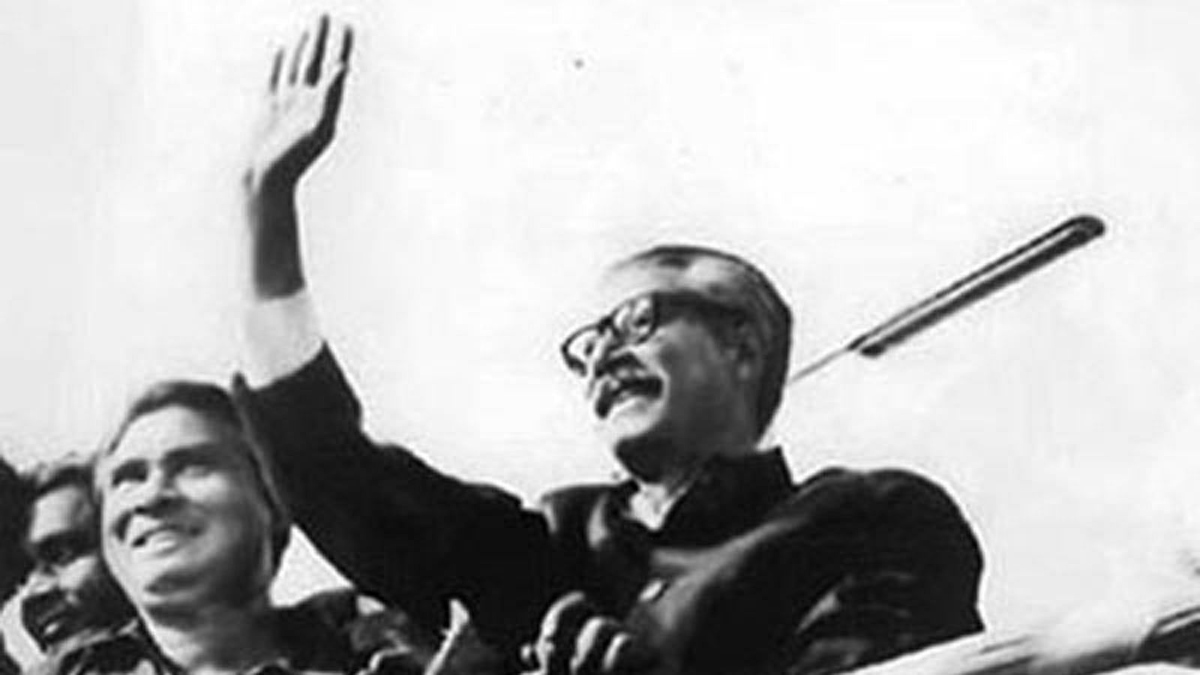


10 January 1972 will always be remembered as a golden day in the history of Bangladesh. On this day, Father of the Nation ‘Bangabandhu’ Sheikh Mujibur Rahman retuned to the land free from tyranny and anarchy. The reign of terror and destruction, aimed at wiping off the very identity of the Bengali people at the brutal hands of the West Pakistani military establishment, which was predominately Punjabi, in connivance with the local collaborators, had finally ended. He came back to the sacred soil of Bangladesh after spending a whole day under execution threat since he was arrested by the West Pakistani establishment.
Bangabandhu was first flown to London, then to Delhi – where he was given a reception accorded to a head of the state, before arriving back. In Delhi, he met Indian Prime Minister Mrs Indira Gandhi, who stood with the Bangabandhu through the thick and thin and the Bengali people at their darkest hour ever in the recorded history. Even the so-called liberal and enlighted superpower stood alongside the Junta of West Pakistan, with a myopic, convoluted version of the genocide which was going on unabated with active patronage. It was the Iron Lady of India who held her ground, deploying all her arsenal, in solidarity with the people of East Pakistan. It is believed that the Indo-Soviet alliance not only deterred the aggressive 7th Fleet from entering the Bay of Bengal during the decisive days of the war of liberation, the diplomatic offensive also ensured that the West Pakistani establishment was prevented from carrying out the death sentence of Bangabandhu.
The Guinness Book of Records, March-December 1971, lists the atrocities on Bengalis as one of the five largest genocides of the twentieth century. Senator Kennedy wanted to visit East Pakistan at the height of the crisis. His visa was refused by the West Pakistani administration. Senator Kennedy however visited the refugee camps in India and was appalled by the conditions there. He also surveyed the bordering areas of East Pakistan to see for himself the condition of the mass exodus. USA officials working in diplomatic institutions within Bangladesh used the terms ‘selective genocide’ and ‘genocide’ (Blood telegram, from Archer Kent Blood who was last American Consul General to Dhaka, East Pakistan 1971) to describe events they knew of at that time, especially during the beginning of Operation Searchlight in March-April 1971.
However, these reports were deliberately downplayed by President Nixon, so advised by Henry Kissinger. The reason behind it was primarily because the USA wanted to protect the interests of West Pakistan as Kissinger was apprehensive of India’s friendship with the USSR, and he was seeking a closer relationship with China. The Chinese supported the West Pakistani administration in 1971 wilfully aware of the campaign of genocide in East Pakistan. Faced with insurmountable losses, the West Pakistani military capitulated in less than a fortnight. On 16th December 1971, the Pakistani forces stationed in East Pakistan surrendered. The Instrument of Surrender was signed at Ramna Race Course in Dhaka at 16:31 hours IST (Indian Standard Time) by Lieutenant General Jagjit Singh Aurora, General Officer Commanding-in-Chief of Eastern Command of the Indian Army, and Lieutenant General A.A.K. Niazi, Commander of Pakistani forces in East Pakistan. After a gruesome and bloody nine months’ struggle, a free Bangladesh was born, thus effectively burying the hypothetical two-nation theory at the bottom Bay of Bengal.
Bangabandhu’s charismatic and iconic leadership had consolidated the focal points of the aspirations of the Bengali people. People of East Pakistan wanted freedom from the clutches of the deep state and being treated as a second-class citizens subjected to catastrophic marginalisation and exploitation. Upon his return, approximately half a million people came to greet him at the Race Course Ground, interestingly this was the same venue of the historic 7th March 1971 speech after which he came to be known as ‘Bangabandhu’ (friend of Bengal).
The year 2022 marks the golden jubilee of Bangabandhu’s return, and presently under the capable leadership of his daughter Prime minister Sheikh Hasina, Bangladesh is determined to achieve and maintain the ‘Pluralistic Principals’ as laid down by Bangabandhu himself.